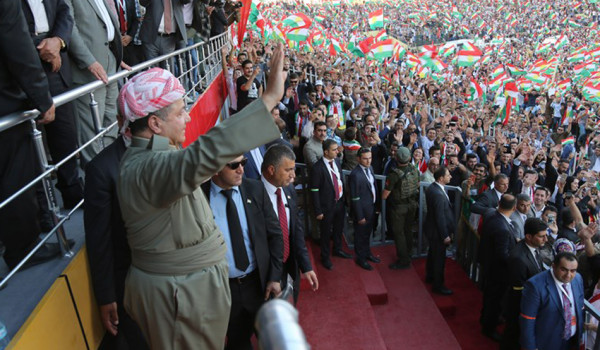An unexpected facebook post is almost leaving what Barzani had been doing to prepare for a referendum on Kurdsih independence go rack and ruin and the dream of travelling around the world with a Kurdish passport is fading away.
” We have decided to accept the Coalition’s proposals as an alternative for the referendum”, this was a facebook post by Jalal Talabani’s elder son, Bafel, which was published late on September 23, 2017.
The brief statement spread a mixed feeling of astonishment and shock throughout the Kurdistan Region, which was only a day ahead from attempting to achieve an ages-long dream of a nation.
Inside Kurdish homes, in the bazaar, in the offices, in the coffee shops and every public place, all the eyes were watching the breaking news emerging on TV screens that divided them on two fronts each marching to the beat of its own drum.
The post was on facebook only 24 hours after an enthusistic speech he delivered before tens of thousands of supporters in Erbil in which he said, “this matter is no longer in mine and my party’s hands. It is now in your hands “, indicating that there is no going back.
Shaking his right index finger, Barzani added, “I am not someone who brings shame on himself in front of his people”.
This was Massoud Barzani’s last campaign for the September 25, 2017 referendum in the Kurdistan Region and the disputed territories, following three months of back and forth and numerous local and international calls to delay it, particularly in the areas disputed by Baghdad and Erbil.
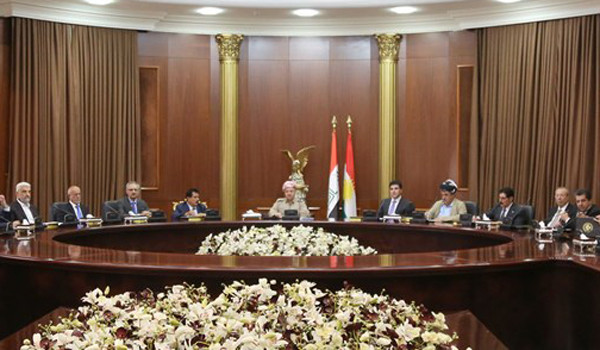
Erbil- Barzani meets representatives of Kurdish parties to decide on referendum date, 07-06-2017
The decision to hold the referendum
on June 7th, 2017, representatives of all Kurdish political parties except for the Gorran (Change) movement and the Islamic group (together with 30 seats in Kurdistan Region parliament) gathered at the Kurdistan Region presidency office.
Barzani, then president of the Kurdistan Region presided over the meeting. It was decided that the referendum on Independence would be held on September 25 in the Kurdistan Region and the disputed territories, while a high commission for referendum was formed headed by Barzani himself.
The decision entered the Kurdistan Region into a new phase. Some political factions said a consensus was needed, others said the decision must be passed by parliament, while other groups argued that it was not the right time for a referendum.
Three days later, the Patriotic Union of Kurdistan (PUK) and the Kurdistan Democratic Party (KDP) decided to reactivate the parliament which was paralyzed for two years due to political disputes, to legalize the referendum.
The decision to hold the referendum was approved by parliament and that was the start of the controversy which lasted for three months and ended with the holding of the referendum.
Apart from Gorran (Change) movement and the Islamic group who believed the ground was not paved for the referendum, all the other parties supported Barzani.
Meanwhile, a movement called “No for Now” for referendum was announced, yet it didn’t have a strong influence on the process.
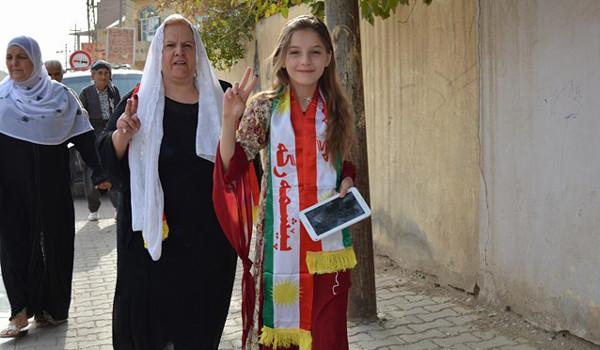
Kirkuk residents participate in referendum, 25-09-2017
Referendum in disputed territories
The issue of holding a referendum in the disputed territories was one of the most controversial issues. The PUK leadership in Kirkuk except for Najmaddin Karim, the then governor of Kirkuk completely rejected the process in the final days of campaigning.
However, the PUK leadership in both Erbi and Sulaimaniyah warmly welcomed the holding of the referendum and campaigned for it side by side with Barzani, particularly Hero Ibrahim Ahmed (Jalal Talabani’s wife), PUK deputy secretary general Kosrat Rasul, Mala Bakhtiar and other politbureau members.
Towards the end of August, 2017, the Kirkuk provincial council then headed by Rebwar Talabani unanimously voted to participate in the referendum, regardless of the Arabs and Turkmen boycott of the council meeting.
on September 12, Massoud Barzani accompanied by Kosrat Rasul paid a visit to Kirkuk where he reaffirmed that the referendum would be held as scheduled and said, “Kirkuk is a Kurdistani city and will take part in the referendum”, igniting tension among the different components of the city.
Only three days after that visit, the PUK leadership in Kirkuk warned Barzani of serious consequences of the referendum in the province.
Rawand Mala Mahmoud, deputy head of the PUK organizational center in Kirkuk told (Kirkuk Now), “The situation in Kirkuk was different. Until September 23, there was a prevailing opinion among the PUK leadership and even some KDP members that the referendum should not be held in Kirkuk. Finally, it was held and brought that situation in Kirkuk”.
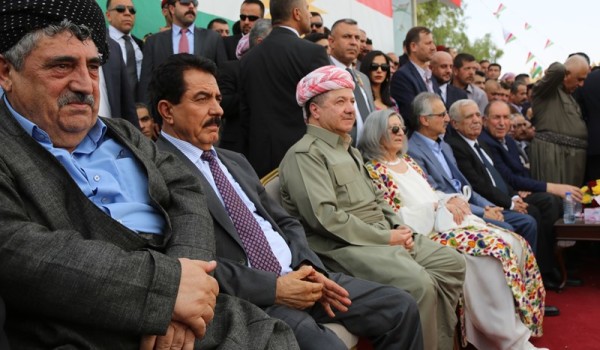
Suleimaniyah- Barzani and PUK top officials attend a campaign ahead of referendum 20-09-2017
Two days before the referendum
The situation was intense. The front which was supporting a delay of the referendum was broadening. The Coalition was discontent, meanwhile Iran and Turkey publicly threatened of consequences.
The position of the KDP remained unchanged, but the atmosphere inside the PUK house was not any good. During the two days ahead of the referendum the different organs of the PUK issued 24 statements, the majority of them supported the delay of the process, except for Kosrat Rasul and Mala Bakhtiar who were in favour.
In the meantime, the PUK decision-making body which was in the hands of Hero Ibrahim Ahmed preferred to remain rather silent.
If the situation in the Kurdistan Region was relatively normal, it was to the contrary in Kirkuk, therefore the conflict moved to this city. It was very likely that the referendum would ne delayed in Kirkuk.
Rebwar Talabani, head of the Kirkuk provincial council and strong supporter of the referendum alongside Kirkuk governor Najmaddin Karim told (Kirkuk Now) that “the PUK tried to delay the referendum in Kirkuk.. In the final days of campaigning I was in a meeting attended by Kosrat Rasul, Najmaddin Kaim, Mala Bakhtiar, Aso Mamand and representatives of other parties. The meeting concluded that there was no obstacle hindering the referendum in Kirkuk. However the PUK did not straightforwardly say that the referendum should not be held there”.
on September 23, the PUK organizational center at a meeting with Kurdish political parties formally rejected holding the referendum in Kirkuk and threatened to prevent the commission from distributing ballot boxes to polling stations.
“In less than 5 hours everything will be disclosed regarding a Turkish intelligence plot against Kirkuk”, this was part of a statement by the PUK leadership in Kirkuk posted on their formal page on Facebook on September 23.
Rebwar Talabani says, “There has been a lot of pressure on me, but I wasn’t adhering to a single political party, in fact I was waiting a decision from all the political parties”.
Time for more deliberations was over. Four Kurdish leaders, whom Barzani was listening to, insisted that the referendum must be held in Kirkuk, according to Rawand Mala Mahmoud. Those were Kosrat Rasul, Najmaddin Karim, Kamal Kirkuki and Muhammad Haji Mahmoud.
“the small parties played a negative role through encouraging Barzani to go on with his plans to hold the referendum”, Rawand Mala Mahmoud added.
An official source who was present at most of the PUK meetings at that time said, “Kosrat Rasul arrived in Kirkuk accompanied by a large number of Peshmargas. If the referendum had not been held, there would have been bloodshed on September 24. Dr. Najmaddin and Barzani himself were supporting him, therefore the PUK leaders in Kirkuk who were against the referendum turned a blind eye”.
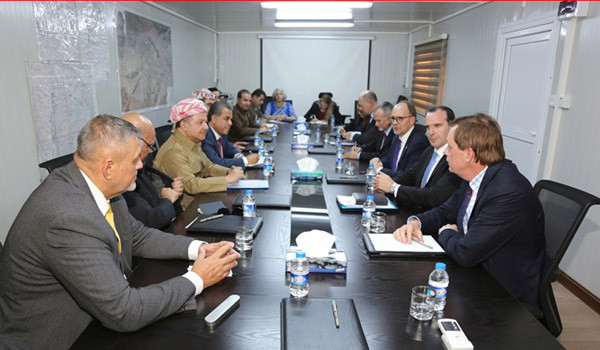
The Coalition’s alternative
During that period, Barzani held dozens of meetings with representatives of the US and a number of European countries.
World ambassadors, foreign ministers and politicians from the US, European and regional countries’ met with Barzani in the Kurdistan Region.
On September 14, only eleven days ahead of the referendum date, a high ranking delegation led by Brett McGurk, the US Special Presidential Envoy for the Global Coalition to Counter ISIS, Jan Kubiš, the UN top envoy to Iraq, Douglas A. Silliman, the US Ambassador to Iraq and British ambassador Frank Baker met Barzani.
At the meeting which was held at the Kurdish Training Coordination Center (KTCC) headquarters in Duhok, the delegation put forth an alternative for the Independence referendum in the Kurdistan Region.
According to the proposal, the issue of the Kurds and the referendum would be taken to the UN meetings. The delegation has also called for the Independence referendum to be delayed for two more years.
Time was passing quickly. On September 23, all preparations for the referendum were in place, and the commission was awaiting the green light.
Just then, a Facebook post by Bafel Talabani, the elder son of the late former Iraqi president of Iraq and Kurdish leader, Jalal Talabani disturbed the situation f0r a few hours.
The post said, “We have decided to endorse the alternative proposed by the United Nations, the US, France and Britain. Therefore we think it is better if we try this alternative and adopt a united agenda before heading to Baghdad to hold historical talks concerning all the pending issues, rather than holding a referendum now”.
Half an hour later, Bafel Talabani said the post was mistakenly published by one of his media office staffers.
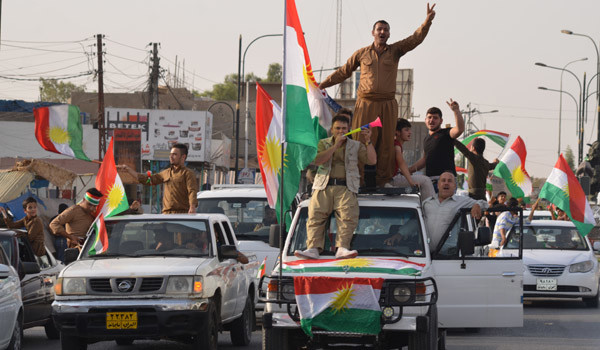
Kirkuk- Jubilant celebrations across the city after the referendum 25-09-2017
The final day
Barzani as the head of the Referendum High Commission called for an urgent meeting of the commission a day before the referendum.
The meeting which was aimed to discuss the Coalition’s proposed alternative, ended with a final statement, “The referendum will be held on time”.
Akram Salih, a KDP leadership committee member speaking to (Kirkuk Now) said, “Despite being under pressure from Gorran Movement , the Islamic Group and some PUK leaders internally as well as the external pressure, President Barzani was determined to hold the referendum”.
92% voted in favour of independence in the September 25 referendum, but the magic turned on the magician.
After 21 days, on October 16, 2017, within 24 hours, Iraqi forces returned to the disputed territories and the referendum outcomes were freezed by Baghdad.
Not only the dream of flying with a Kurdish passport did not come true, but also it became difficult for Kurds to fly with any other passports for a long while after that.

